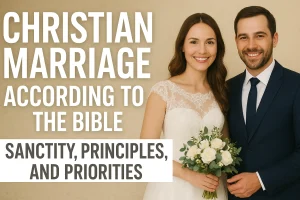What is Marriage?
Text: 1 Corinthians 7:1–40
“Marriage is honourable in all, and the bed undefiled: but whoremongers and adulterers God will judge.” — Hebrews 13:4
Introduction
The Apostle Paul wrote 1 Corinthians to correct church anomalies and answer pressing questions. After addressing divisions, immorality, and litigation in chapters 1–6, he turns in chapter 7 to offer a scriptural foundation for marriage. His instruction remains vital today as believers face cultural pressures and conflicting opinions about marriage, celibacy, separation, divorce, and remarriage.
Divine Precepts Concerning Marriage
Key references: 1 Corinthians 7:1–9, 25–39; Genesis 2:18–25; Matthew 19:3–12; Ephesians 5:22–33; 1 Peter 3:1–7.
God-Ordained Purpose
Marriage is ordained by God to address loneliness, provide a suitable helper, enable procreation, secure purity, and provide mutual pleasure and companionship (Genesis 2:18–25; 1 Corinthians 7:2–3).
Monogamy and Volition
The biblical standard is heterosexual monogamy: a committed union between one man and one woman. Marriage should be entered into voluntarily, after prayerful consideration and counsel, not by social compulsion.
Mutual Benevolence
Paul’s instruction to “render benevolence” emphasizes conjugal rights and broader responsibilities: love, kindness, patience, forgiveness, and generosity. A healthy conjugal life depends on these virtues; prolonged, unilateral abstinence is discouraged.
Answer: Marriage is God-ordained, monogamous, voluntary, and founded on mutual benevolence and spiritual commitment.
The Sanctity of Marriage
Key references: 1 Corinthians 7:10–16, 39–40; Genesis 2:24; Malachi 2:14–16; Matthew 5:32; Romans 7:2.
Marriage is a sacred, lifelong covenant. Paul reinforces Christ’s teaching that divorce and remarriage while a spouse lives runs contrary to God’s original intent. God desires permanence: “What God has joined together, let no man separate.” (Matthew 19:6)
Permitted Separation (but not remarriage)
- Unbelieving partner departs: If a spouse converted to Christ remains with an unbelieving partner, the relationship should continue if the unbeliever stays. If the unbeliever departs, the believer is released from coercion (1 Corinthians 7:12–15).
- Fornication at betrothal: Historically, premarital immorality during betrothal could justify separation; Mosaic law once applied severe penalties in such cases (Matthew 19:9).
Important: Separation does not automatically grant the right to remarry. Remarriage is scripturally permitted only on the death of the spouse (1 Corinthians 7:39).
Answer: No—separation may be allowed in rare cases, but remarriage is only permitted after the death of the spouse.
Sanctification of the Household
Paul teaches that a believing spouse can sanctify the household, influencing the unbelieving partner and children toward holiness (1 Corinthians 7:14).
Answer: Through consistent godly living and testimony, the believer creates a spiritual atmosphere that predisposes family members to faith.
The Priority of Spiritual Pursuits
Key references: 1 Corinthians 7:29–35; 1 John 2:17; Matthew 6:33; Luke 10:38–42.
Paul reminds Christians that earthly relationships must not overshadow eternal priorities. Whether married or single, believers should pursue spiritual growth first. Marriage adds responsibilities that can potentially distract from spiritual focus; therefore, every believer must hold eternity in view when making decisions about marriage.
Answer: Parents should support rather than hinder their children’s marriages. Widows and widowers may remarry, but only “in the Lord,” after prayerful consideration and counsel.
Conclusion
The Bible presents marriage as a divine institution: a holy, monogamous, lifelong covenant formed for companionship, purity, and mutual support. Christians are called to mutual benevolence, to honor the sanctity of marriage, and to prioritize spiritual pursuits above earthly concerns. Where separation occurs, Scripture provides limited allowances, but remarriage is permitted only after a spouse’s

